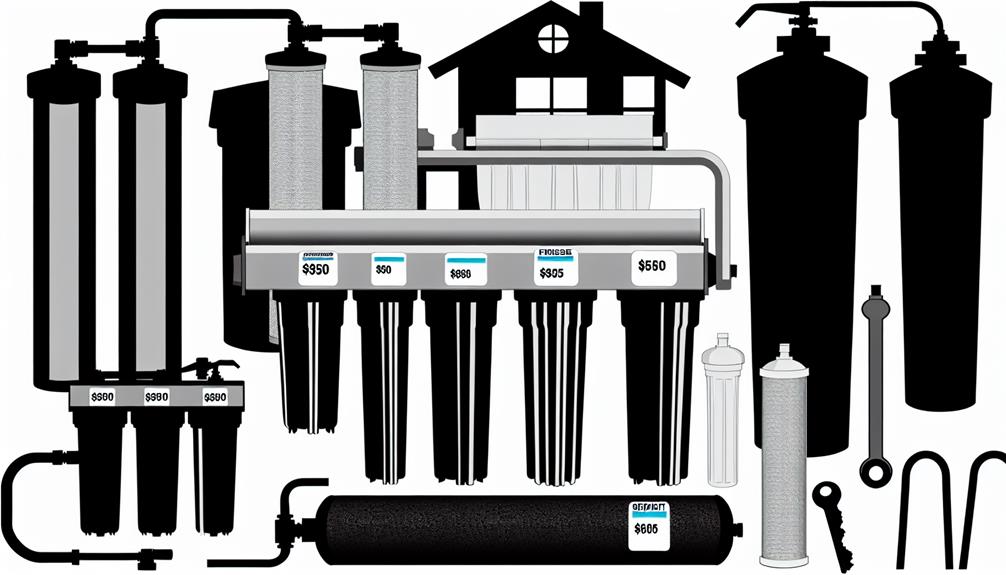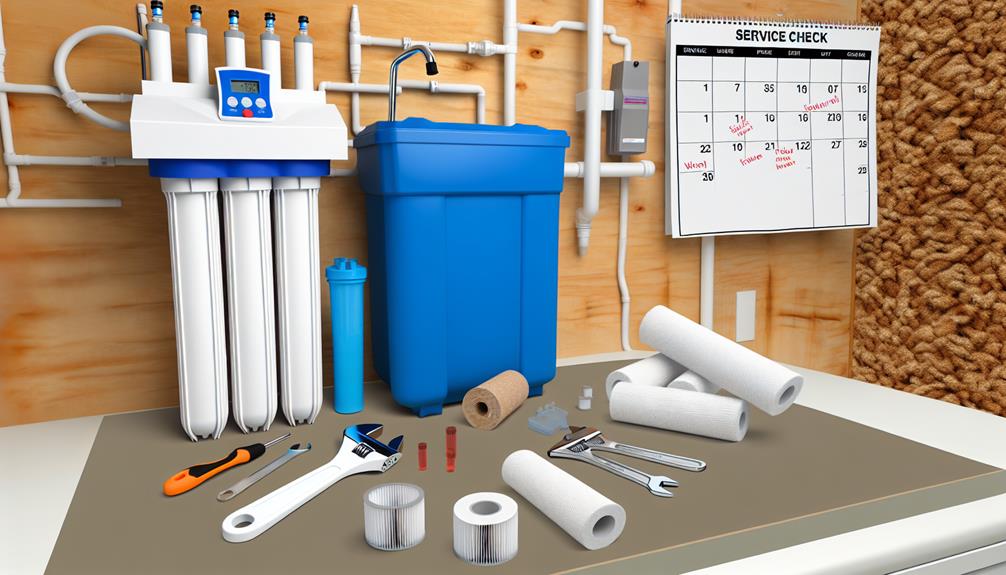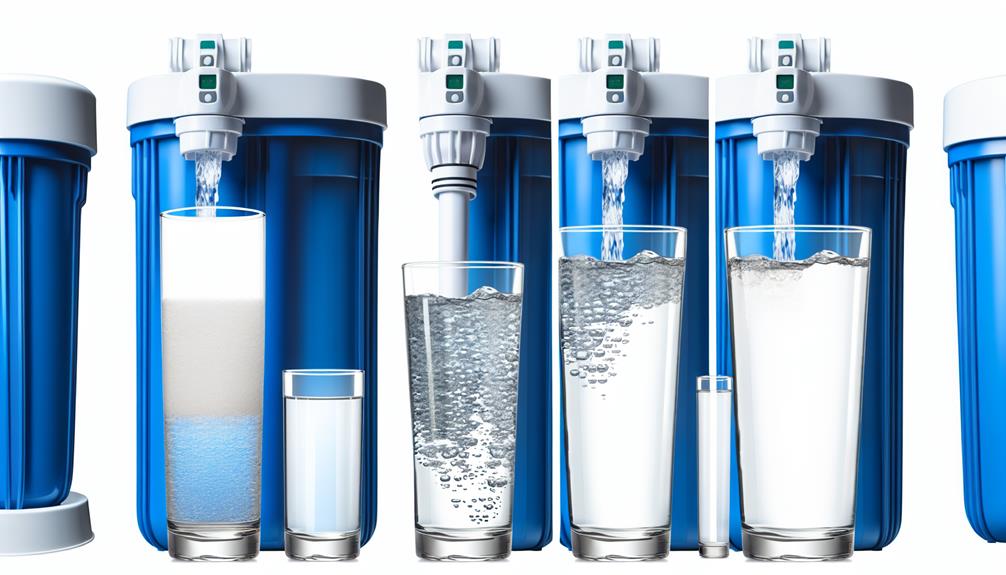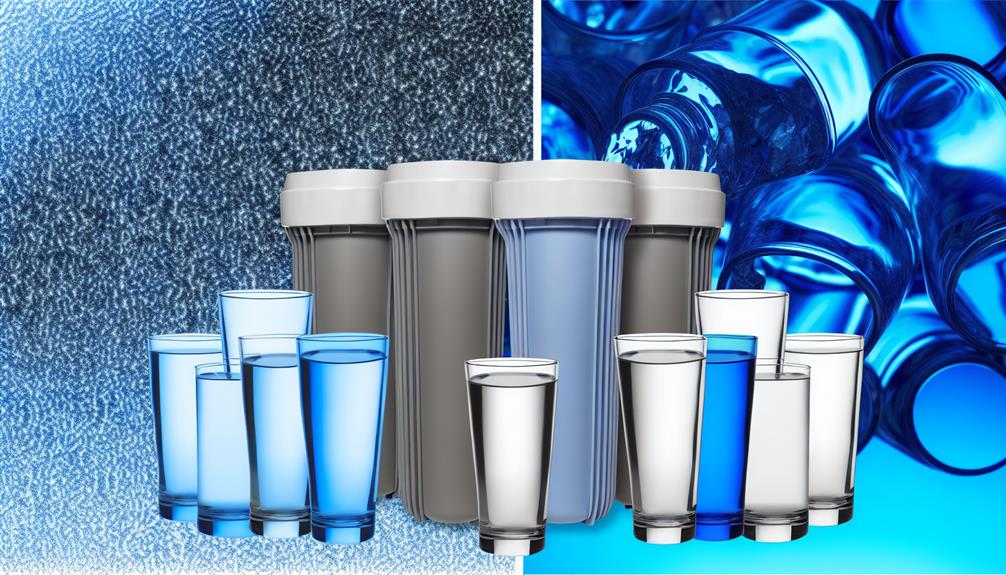As you wade through the myriad of options for whole home water filtration, finding the right system can be as daunting as navigating a labyrinth.
You're well aware that clean water is crucial for your family's health, but the costs associated with installing a comprehensive filter system can be steep. It's important to consider the types of filters available, as they come with varying price tags and maintenance needs.
You'll need to weigh the initial installation costs against the long-term benefits, and decide if a do-it-yourself approach is feasible or if you should hire a professional. Moreover, understanding when to invest in higher quality equipment and when to opt for more cost-effective solutions can make a substantial difference to your budget.
Let's examine how you can secure a dependable water filter setup for your home without breaking the bank, and what key strategies can help you maintain both water purity and fiscal prudence.
Assessing Filter Types

When choosing a whole home water filter, it's essential to understand the various types available, each with distinct mechanisms and contaminants they target for removal. Filter lifespan and contaminant removal are critical factors in your decision-making process.
Mechanical filters, for instance, rely on a physical barrier to remove sediment and particulate matter. The micron rating indicates the size of particles blocked, with lower microns equating to finer filtration. However, while effective against physical impurities, these filters don't address chemical contaminants.
Activated carbon filters excel in adsorbing organic compounds, chlorine, and chloramines, improving taste and odor. Their porous structure increases surface area, but the filter lifespan varies based on water usage and contaminant concentration. Regular replacement is necessary to maintain efficacy.
Ion exchange units, commonly known as water softeners, swap calcium and magnesium ions for sodium or potassium, preventing scale buildup. They require periodic regeneration with salt to maintain performance.
Reverse osmosis systems offer comprehensive contaminant removal, including dissolved solids, heavy metals, and certain microorganisms. They incorporate a semi-permeable membrane and often include pre-filters and post-filters. Despite their effectiveness, they produce wastewater and have a slower filtration rate.
Assess each type's compatibility with your specific needs, considering ongoing maintenance, filter lifespan, and the spectrum of contaminant removal required for your water supply.
Installation Cost Factors
Having assessed the different types of whole home water filters, you'll now need to consider the installation costs which can vary widely depending on several factors. One critical element affecting the price is the filter lifespan. Filters with a longer lifespan may have higher upfront costs but typically require less frequent replacements, potentially saving you money in the long run.
Pre-installation preparation is another cost determinant. This includes any modifications needed to your plumbing system to accommodate the new filter. If your system needs significant alterations or updates, this could increase labor and material expenses.
Below is a table outlining some key factors that influence installation costs:
| Factor | Impact on Cost | Consideration |
|---|---|---|
| Filter Type | Certain types may require more complex installation procedures. | Complexity of installation |
| Filter Lifespan | Longer lifespan filters may cost more upfront but less over time. | Frequency of replacement |
| Pre Installation Preparation | Necessary plumbing modifications add to initial costs. | Extent of plumbing work required |
| Labor Rates | Rates can vary by region and contractor expertise. | Contractor selection and location |
| Additional Equipment | Any extra components like pressure gauges or bypass valves add to the total. | Necessity and compatibility of additional equipment |
Maintenance and Replacement

To ensure your whole home water filter continues to perform optimally, regular maintenance and timely replacement of filter media are essential components of ownership. The longevity and efficiency of your system are highly dependent on these practices. Neglecting them can lead to compromised water quality and potentially costly repairs.
Here's what you need to keep in mind:
- Monitor Filter Lifespan: Each filter has a specific lifespan, often measured in gallons filtered or months of use. Adhering to the manufacturer's guidelines is crucial for maintaining water quality and system integrity.
- Conduct Periodic Inspections: Regularly inspect your system for signs of wear or damage. Components like O-rings and seals can degrade over time and may require replacement to prevent leaks and maintain pressure integrity.
- Review Warranty Options: Familiarize yourself with the warranty options provided by the manufacturer. They often cover replacement parts and can offer insight into the expected lifespan of the system's components.
Undertaking these steps won't only prolong the life of your whole home water filter system but also ensure that it provides the cleanest water possible for your household. Always consult your system's user manual or a professional for specific maintenance guidelines and schedules.
DIY Vs. Professional Setup
While understanding maintenance is crucial for the longevity of your whole home water filter, deciding whether to install the system yourself or engage a professional is a critical step that warrants careful consideration.
DIY installations may seem cost-effective, but they require a solid grasp of plumbing systems, adherence to local building codes, and an understanding of the specific filtration technology. You'll need to ensure proper configuration to maintain optimal water quality and avoid inadvertent damage to your home's plumbing infrastructure.
On the other hand, professional setup, though initially more expensive, typically guarantees a higher level of technical proficiency and compliance with industry standards. Experts are equipped to optimize filter longevity through precise installation, reducing the likelihood of system malfunctions that could compromise water quality. They can also provide valuable insight into the maintenance schedule and potential future upgrades.
Ultimately, your decision should align with your technical acumen, budget constraints, and the importance you place on long-term water quality assurance. If you're not fully confident in your ability to execute a flawless installation, it's advisable to invest in professional services to safeguard your system's effectiveness and durability.
Finding Affordable Suppliers

Begin your search for affordable suppliers by comparing prices and services from reputable distributors known for quality whole home water filtration systems. Ensure technical accuracy by examining the filtration technology, flow rate specifications, and contaminant reduction capabilities. Suppliers that offer comprehensive services, including installation and maintenance advice, alongside competitive pricing should be at the top of your list.
To convey a deeper meaning for cost-effective procurement, consider the following:
- Bulk Buying Advantages: Purchasing multiple units or long-term supply of replacement filters can result in significant discounts. Negotiate with suppliers for wholesale rates that can lead to economies of scale.
- Seasonal Deals Monitoring: Keep an eye out for seasonal promotions and clearance sales. Manufacturers often offer substantial savings during new model rollouts, holiday seasons, or end-of-financial-year clearances.
- Supplier Network Expansion: Expand your network by attending trade shows, subscribing to industry newsletters, and joining forums. These platforms can lead to discovering lesser-known suppliers who may offer competitive rates without compromising on system performance or reliability.
Adopting a detail-oriented approach in your supplier selection process will ensure that you secure a high-quality whole home water filtration system at the most economical price point.
Conclusion
In conclusion, you've learned that selecting the right filter is important for a whole-home water filter setup. Understanding installation costs and considering maintenance are also vital in cutting costs. Weighing the benefits of DIY against professional installation can impact your budget significantly.
Always look for reputable suppliers offering competitive prices without compromising on quality. By integrating these strategies, you'll ensure a cost-effective and efficient water filtration system for your home.

